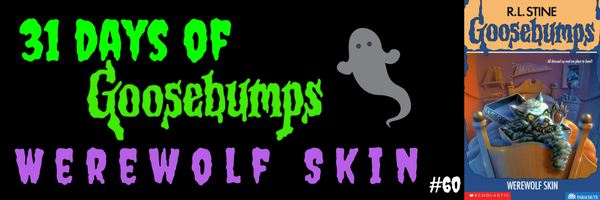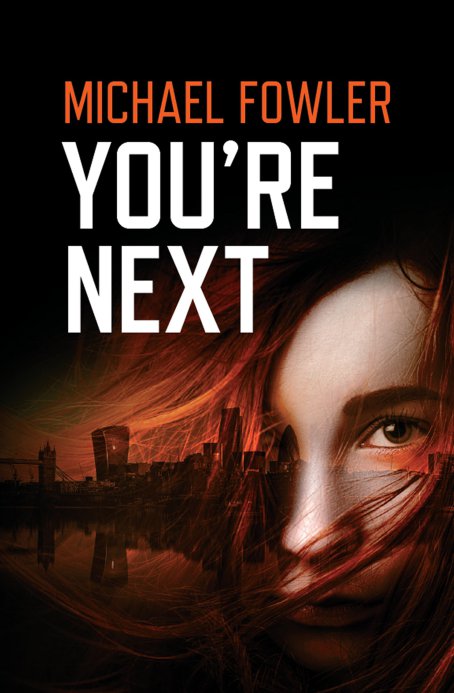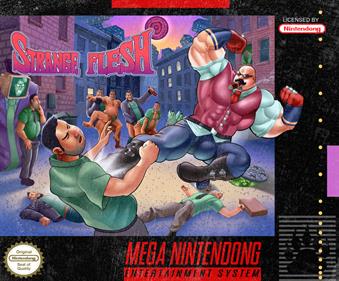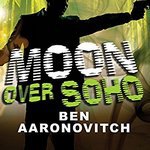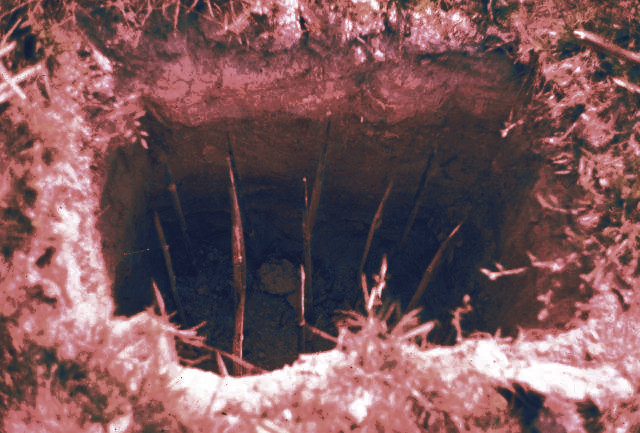
When I returned from the city I settled into a new routine. During the day I slept, dreamless. At night I walked laps around the basement, blowing smoke at the concrete floor, the cracks underfoot growing bigger.
In between I watched television, infomercials mostly. For hours I sat on my mother’s couch, silently wishing I had the money for those four easy payments. I wanted Billy Mays to solve all of my problems, but Billy Mays was dead.
I was without work so I started spending a lot of time in the woods, partly to get out of the house, but mostly to contemplate self-inflicted violence.
There was a spot up the ridge where someone else had done it before about ten years back. A kid, still in high school, hanged himself from a tree.
They built a monument in remembrance, the boy’s name and the years of his lifespan carved into a white rock, stationed by the entrance to the clearing by the cliff. A winding pathway led there off a one-lane road that zigzagged up the mountain, a place known mostly to locals.
I knew I was being unoriginal, a copycat without any new ideas. Choosing a suitable location to kill oneself can be challenging for those of us with little imagination. My final act would be yet another rip-off in a series of clumsily rendered impersonations, my existence would culminate in this ultimate contrivance.
The first time that I re-visited the site I found the stone chimney in ruins. A small cabin had once stood in the clearing, until time steadily swept away its quaint little walls, the charming slate roof, the rugged handmade foundation.
Somehow the chimney and fireplace remained for years after the rest of the structure had crumbled. It was a place where many of us gathered during our teenage years, some to party, others to kill themselves. Initially I was one of the former. How people change.
At the end of the path, I stopped to survey the damage. Crumpled beer cans lay in a pit scorched black by the fire that had been there prior. The ashes were still warm. Where the chimney once stood was now a pile of rubble.
I took a picture on my phone and sent it to my friend, Alfred, who was still living in the city that I had just left. I nudged the fallen rocks with my foot then picked up a stone. I lobbed it over the edge of the cliff.
I could see why they had done it. The tangibility of the destruction felt good. I threw another piece and listened for the satisfying snap of earth hitting earth. I wondered if I could ever sound like that.
I started eating mostly at the gas station because it was the only place that stayed open all night. In the pre-dawn hours I sat in my car in the parking lot, chewing the greasy brown meat smashed between stale buns and sweating cheese.
Warm mayonnaise dripped out onto my lap as I choked down the delicious death, contented by the satisfaction of still being cheap even as I ate my way towards oblivion. The stolen chocolate bars I had pocketed melted steadily, waiting for their turn.
I drove home and pissed in the backyard, before sneaking inside past my mother’s bedroom, to finally fall asleep on my broken bed as the sun rose and she got up for work. We did not see much of each other, except on those days that I simply abandoned sleep altogether.
I would cook her breakfast and talk her ear off about news and gossip I had heard, what so-and-so was up to, what my ex was saying about me. She would drink coffee and listen, thanking me for cooking on her way out the door.
Those mornings were best for venturing up the mountain and they became more and more frequent, until eventually it was a daily occurrence. My routine had changed. About when I started spending so much time outside was also when people started finding traps in the woods.
The first one nearly decapitated a cyclist who was riding a mountain bike down one of the Watershed’s many trails. Coming off a steep rocky pass, the cyclist unexpectedly caught a length of steel wire with his neck. The cable had been strung across the path deliberately, both ends tied neatly to adjacent trees.
Later in the hospital, nursing a crushed trachea, the cyclist claimed that the only reason his head had remained intact was that as he was speeding along, he suddenly noticed a glint in the sunlight a few yards ahead at about eye level. He gripped the handle brakes in time to lessen the severity of the blow.
The second trap was found by a dog, a retriever that had been out for a leashless walk with a woman who lived in one of the secluded mountainside homes. Its whimpering had brought the woman over to a spot further down the same trail that they both strolled up and down every day.
She found the retriever limping, its leg freshly red. Following the trail of blood, she discovered a large pointed razor jutting from a pile of fallen leaves, the wooden base embedded securely in the ground. When she phoned the city officials, she was unaware that the police were already investigating the traps.
More blades turned up as forest rangers notified the public with warnings about traveling through the Watershed. The cyclist community was tight knit enough to spread whatever caution they could, posting in online forums to solicit what was to be done.
They swapped theories about who was responsible for setting the booby traps and the possible intention behind it all. The consensus seemed to be that whoever was going to all this trouble was doing so to scare people away.
I discussed the news with my dealer whenever I paid him a visit. Sneaking in through the side door, I would always find him in the kitchen, crowned by a low-hanging rack of well worn copper pots that dangled precariously from the ceiling, garlic and thyme with butter roasting in a pan on the stove in order to cover up the smell.
He would ask me how everything was going as he handed me the vacuum-sealed package that I had paid for. I always took a moment to step into the other room where he had his easel and canvas perpetually set up.
On display sat a hyper realistic painting of some koi fish swimming through a clear pond. It was a commission from a client, he told me, and he had been working on it for the past five years. I never found out if he finished it or not.
He was the first person to mention the traps to me. Being himself an avid cyclist, he had seen one of the makeshift devices firsthand while he was biking the trails with a friend.
He described the razor as being about five inches tall, the shape of a right triangle, rusted from exposure. The small wooden block that it rested in had been neatly cut, the blade fixed into a manmade groove.
His friend had almost been thrown off his bike when he collided with the jutting sheet of metal, his front tire shredded upon impact. They decided to leave the trap, lest some sort of evidence be disturbed.
Together they took turns carrying the crippled bicycle down the mountain, until they finally got a cell signal and called the forestry service to report their find. He preferred not to go to the city police.
One night I awoke in my car, parked behind my mother’s house. The steering wheel was bent, as if from a forceful blow. My hands ached and when I looked down I noticed there was dirt under my fingernails.
I located the source of the pain, a sizeable gash on the palm of my left hand. My phone had at least a dozen outgoing calls, all of which had gone unanswered.
I asked my neighbor what he knew about booby traps when I saw him on his front porch one day. He was a retired contractor, an overweight diabetic with a bad heart, and also missing his left arm, which had been blown off by a mine in Vietnam. To everyone in the neighborhood, he was affectionately known as “the one-armed carpenter.”
I figured he could provide some insight about the recent disturbances up in the Watershed. After muttering something about gooks and cowards, the one-armed carpenter retrieved a large book from his house and opened it before me.
The volume seemed to be a catalogue of Viet Cong atrocities, black and white illustrations of soldiers running into trip wires rigged to grenades, photos of deeply dug pits lined with wooden spikes fiendishly camouflaged by big leafy branches, ornamented by live ammunition cartridges hidden under bamboo slats, and the mutilated bodies of U.S. troops who had unwittingly stumbled upon the devices.
The one-armed carpenter pointed out one photo in particular. It took a moment to register, but then I noticed the resemblance. There was my neighbor posed for the camera, much younger and even more so thin, his newly acquired stump still tightly bandaged. He told me to keep the book then disappeared back into his house.
My mother bought a new television set and had my brother and I install it. We took the old one, a monolithic black cube with faulty wiring and distorted picture quality, up to the Watershed. My brother and I despised that heavy, dull box, a hand-me-down from our estranged father, one of the few dwindling objects he had left that still tied us to him.
We pulled over on a scarcely used back road and together hauled the television out of the car and onto the dirty gravel. I popped open the trunk and extracted work gloves and safety goggles, putting them on for protection. With some effort, I lifted out the sledgehammer we had taken from our mother’s garage.
I told my brother to stand back as I aimed the hammerhead carefully at the blank screen. I wound up, bringing the sledge over my shoulder before swinging it down and across, the momentum of the arc plunging the blunt block of steel straight into the empty face of our most loathed entertainment.
As the glass burst, the implosion was much louder than we had anticipated. It sounded like a gunshot and echoed through the forest, ricocheting from trees and startling the birds into flight. We worried someone might have heard, so we shoved the remains off the side of the road into a ditch and sped off, leaving the mutilated jumble of electronic guts to rot amongst the blanket of dead leaves.
After several months of radio silence, I received a message from my ex. She sent me a photograph of herself, the platinum blonde hair that I was accustomed to now replaced by inky black. She was curious to know what I thought of her new look.
I wanted to say that I barely recognized her, that I preferred her old hairstyle, that I wanted her to take me back, that I had quit sleeping to avoid the dreams, that I had cracked open the knuckles on my right hand from punching a refrigerator, that I wept watching all night infomercials, that my gas station diet was making me painfully constipated, that I was sorry for all the voicemails I did not remember leaving her, that I had doubled my mother’s water bill by taking sixty minute showers as a substitute for emotional warmth, that I was investigating a string of mysterious booby traps set in the very same woods by the very same pond where we used to swim, that I was not even sure if it was in fact myself who had been setting those traps all along, that sooner or later somebody was going to really get hurt and maybe I was okay with that because nobody in the world felt worse than me anyway, that the bottom of a punji stick pit was preferable to the musty basement I now inhabited, that I wanted to step on a razor so big that it would slice me neatly in half and all the tetanus shots in the world would be unable to save me, that I would gladly give the one-armed carpenter my own limbs since they would soon be of no use to me, that meeting her those years back had been the greatest booby trap of all.
Instead I told her that she looked nice, and then I turned my phone off for the last time.
By the fire pond, I reminisced as I often did, made no sense of it as I always did, and eventually decided to swim. I stripped off my clothes and eased into the scummy, tepid water. When the bottom gave out, I treaded my way further into the pond until I was quite far from the shore, a beach of sharp rocks and broken glass.
I floated listlessly amongst the lily pads, which were in abundance from a particularly rainy season. My feet became caught in the thick vines beneath the murky water. The tendrils seemed to tighten the more I struggled to free myself.
Soon I was pulled under, ensnared by the intertwining network of aquatic roots. And so I had fallen victim to yet another trap, a conclusion more sophisticated than any I could have ever conceived.
I sank deeper, coming to rest on the soft bed of muck, silt billowing up around me, algae kissing my mouth, my lungs filling with liquid as down and down I went, into the place where the dead make our fuel, to become just one of many sedimentary layers, a common fossil.
I knew it would be over soon, but I felt content knowing that whether by water or whether by mud, the world would end me one way or another before I could end myself.
Matt Lee is a writer and actor living in Maryland. His work has appeared at fluland, Philosophical Idiot, Street Carnage, and The Annual. He has written and directed numerous original works for the stage at Maryland Ensemble Theatre. He tweets @Gallows_Ticket.
Share this:
